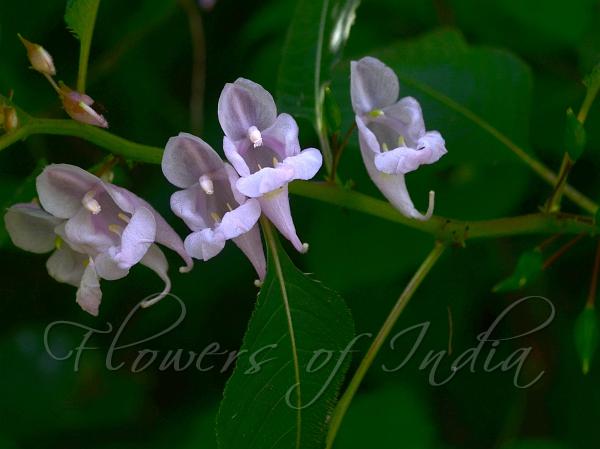|
| East-Himalayan Flowering Balsam |
|

|

| File size | 532626 |
| Original date | 9/6/20 7:25 AM |
| Resolution | 4928 x 3264 |
| Flash | Flash did not fire, auto |
| Focal length | 60.0mm |
| Exposure time | 1/400s |
| Aperture | 6.3 |
| Focus Distance | |
| Metering Mode | Center weighted average |
| Camera make | NIKON CORPORATION |
| Camera model | NIKON D7000 |
| Sensor type | OneChipColorArea |
|
|
|
|
Photo: |
Botanical name: Impatiens florigera Family: Balsaminaceae (Balsam family)
East-Himalayan Flowering Balsam is a herb with stems
erect, round, hairless. Inflorescence is borne solitary, in leaf-axils,
in the upper parts of the plant, usually hairless. Flowers are
bisexual, lilac to cream white, flower-stalk slender, about 1.5-2 cm
long, sepals 3, overlapping, 2 lateral ones flat, small, linear
lanceshaped, hairless, about 2-3 mm long. Posterior sepal (Lip) is
large, petal-like, shaped like the end of a horn, about 5-8 mm long and
9-12 mm deep, spurred, spur constricted gradually, thread-like, about
4-5 mm long. Upper standard petal is round, many veined, tip shallow
notched, about 4 x 3 mm across, lateral ones (wings or alae), fused in
pairs, bilobed, basal lobes triangular-ovate, distal lobes narrow
ovate, narrow just above middle. Stamens are 5, anthers bi-locular.
Leaves are alternate, lanceshaped-ovate to narrow elliptic, about
2.5-9.5 x 1.5-3 cm across, base wedge-shaped or narrowed, margins
shallow sawtoothed with few thread-like appendages towards base of the
leaf, tip deeply pointed to tapering, lateral veins about 5-11 on
either side of the midrib, papery, green above and paler and whitish
beneath. Leaf-stalk is slender, about 2.5-6 cm long, stipular glands,
about 1.5 mm long. Fruit is a not-splitting capsule, narrow
spindle-shaped, about 1.5-1.2 cm across, swollen in the middle,
hairless. East-Himalayan Flowering Balsam is found in East Himalaya,
| Identification credit: Rajib Gogoi | Photographed in Aizawl, Mizoram. |
• Is this flower misidentified? If yes,